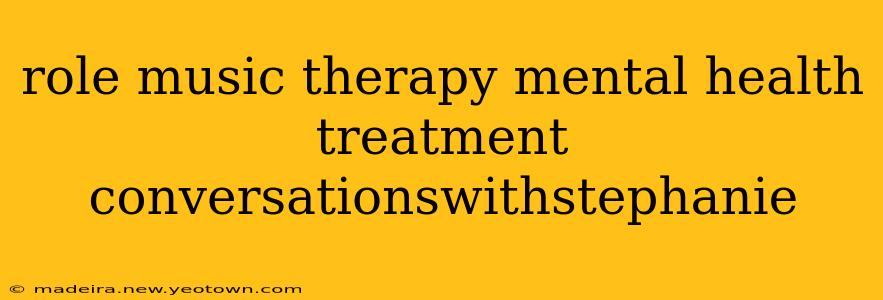Music. It's a universal language, capable of evoking powerful emotions and memories. But did you know it's also a powerful tool in mental health treatment? This isn't just about listening to your favorite tunes; we're talking about music therapy, a discipline that's gaining increasing recognition for its ability to heal and transform lives. Today, we'll delve into the world of music therapy, exploring its role in mental health treatment through conversations with Stephanie, a seasoned music therapist.
Stephanie, with her years of experience, offers invaluable insights into the multifaceted nature of music therapy and its impact on individuals facing various mental health challenges.
What is Music Therapy?
Many people envision music therapy as simply listening to calming music. While relaxing music can certainly be beneficial, music therapy is far more comprehensive. It's a scientifically-based, evidence-informed clinical practice that uses music interventions to improve the physical, emotional, cognitive, social, and spiritual health of individuals. It’s about actively engaging with music in a therapeutic setting, guided by a trained professional.
How Does Music Therapy Help with Mental Health?
Music therapy's effectiveness stems from its unique ability to tap into our emotions on a deep level. Through playing instruments, singing, songwriting, or simply listening to and discussing music, individuals can process and express feelings they might struggle to articulate with words. This non-verbal approach is particularly helpful for those who find it challenging to communicate their experiences verbally.
What are the different techniques used in music therapy for mental health?
Music therapy employs a diverse range of techniques tailored to the individual's needs and goals. These can include:
- Active music making: This could involve playing instruments, singing, songwriting, or improvising music. This allows clients to express themselves creatively and explore their emotions in a safe environment.
- Receptive music listening: Listening to specific types of music, often selected to evoke certain emotions or memories, can help individuals process their feelings and experiences.
- Music-assisted relaxation: Techniques like guided imagery with music can help reduce anxiety and promote relaxation.
- Lyric analysis: Examining song lyrics can provide insight into a client's thoughts and feelings, facilitating self-awareness and emotional processing.
Can music therapy help with anxiety and depression?
Absolutely! Music therapy has demonstrated effectiveness in managing symptoms of anxiety and depression. The creative process involved in music making can provide an outlet for emotional expression, while listening to specific types of music can promote relaxation and improve mood. The therapeutic relationship developed with the music therapist also provides a crucial support system.
Is music therapy suitable for people with trauma?
Yes, music therapy can be a valuable tool in trauma recovery. Music offers a non-threatening avenue to access and process traumatic experiences. The therapist can work with clients to create music that reflects their experiences, offering a sense of control and empowerment.
How is music therapy different from other mental health treatments?
While music therapy can complement other mental health treatments like psychotherapy or medication, it offers a unique approach. It's not a replacement for these methods but a valuable addition. Its focus on non-verbal communication and creative expression makes it particularly effective for individuals who struggle to articulate their experiences verbally.
How can I find a qualified music therapist?
Finding a qualified music therapist is crucial. Look for therapists who are board-certified and have experience working with the specific mental health challenges you’re facing. Professional organizations like the American Music Therapy Association (AMTA) can help you locate practitioners in your area.
Stephanie concludes our conversation by emphasizing the importance of considering music therapy as a valuable complementary treatment for various mental health conditions. Its holistic approach, combining creativity, emotional expression, and therapeutic support, offers a unique path toward healing and well-being. Remember, music’s power to soothe, inspire, and heal is a powerful force that deserves recognition in the world of mental health care.

